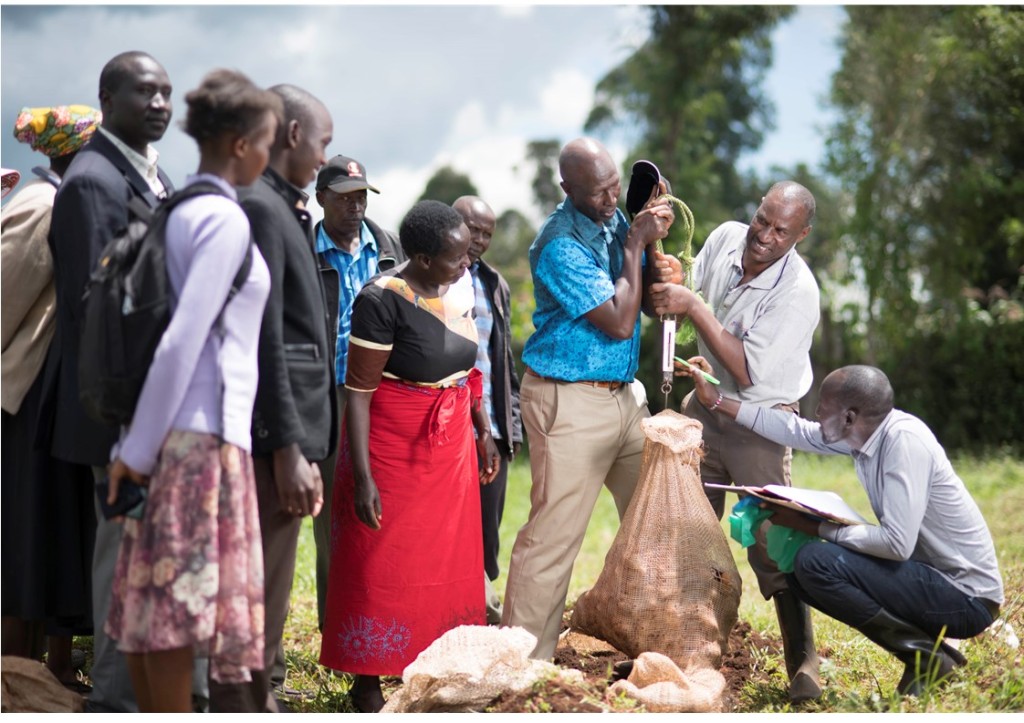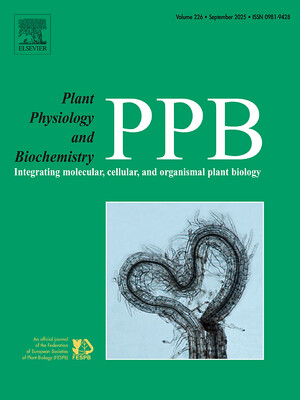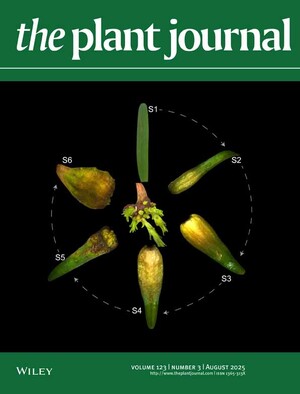
Nandi Potato Cooperative driving potato to an enterprising commercial crop in Nandi County
 Members of the Nandi Potato Cooperative Society weigh their seed potato harvest at their farm in Nandi County.
Members of the Nandi Potato Cooperative Society weigh their seed potato harvest at their farm in Nandi County.
Around 2015, Nandi County with its vast agricultural land and potential had only about 70 farmers growing potatoes on about 70 hectares (ha), according to Silas Too, potato value chain coordinator, Nandi County Government. This was mainly due to the fact that traditionally, potato was not a staple food but a snack among communities, and as such was mainly grown for the limited market. There was also lack of awareness and knowledge on its potential as a cash crop, compounded by diseases – late blight and bacterial wilt – and the associated poor yields witnessed on the few farms in the county.
However, Nandi with its cool climate, high rainfall, well-drained to loose soils, and the sunshine, is a high potential region for potato production. It is a potential that caught the attention of the Accelerated Value Chain Development (AVCD) program that is funded by the United States Agency for International Development (USAID)/Feed the Future. The International Potato Center (CIP) leads implementation of AVCD’s potato value chain component. The entry of AVCD in 2016 was the turning point in the transformation of potato, from an orphaned crop to a highly enterprising commercial crop.
After in depth assessment of the potato value chain in Nandi County, AVCD identified access to certified seed as the main constraint to exploiting the high potential of potato farming in Nandi County. In response, AVCD embarked on seed system development by supporting farmer groups to produce certified seed and enable them to save quality seed on farm using specific technologies. Initially, AVCD adopted an informal seed system approach by vetting progressive farmers to become seed multipliers to decentralize seed production, as there was no seed production in Nandi. AVCD support to the seed businesses included extensive technical capacity development through training and follow up one-on-one technical backstopping at the seed production sites; providing starter material – basic seed and apical cuttings to produce certified seed; and supporting establishment of diffused light stores for storage and breaking seed dormancy.
Through the ward agricultural officers (WAOs), CIP created awareness, sensitized and trained farmers on good agricultural practices (GAP), postharvest handling and farming as a business. In 2016 alone, Nancy Chebii, WAO, Ollessos Ward and Francis Omamo, WAO, Emgwen Ward trained 600 and 200 farmers respectively on GAP. This was undertaken at learning farms hosted by a progressive farmer established in each ward. The trainings and field days generated a lot of interest among the farmers. The cost-benefit analyses opened up farmers’ eyes on profitability of potato farming in the County. By the end of 2018 in partnership with Farm Input Promotions Africa, 10,223 farmers were applying productivity enhancing technologies as a result of exposure to GAP at learning farms or receiving a promotional pack of certified seed to observe on farm the benefits of good seed.
Consistently using certified seed as starter material for onward multiplication and quality assurance were the major bottlenecks to the seed multiplier approach. To resolve this, seed system development followed the formal seed approach to produce certified seed. A seed unit was established with AVCD linking and supporting the progressive farmers to produce certified seed by linking them the Agricultural Development Corporation (ADC-Molo) – a licensed potato seed merchant – to produce certified seed as an outgrower under their merchant’s license.
 NPFCS official receiving the Seed Merchant License from a KEPHIS official
NPFCS official receiving the Seed Merchant License from a KEPHIS official‘Armed with certified seed of improved potato varieties and applying GAP, farmers have since seen their farm productivity increase more than 10-fold from as low as 2.4 tonnes/ha to 29 tonnes/ha,’ states Chebii adding, ‘Potato is emerging as a food security and enterprising cash crop in Nandi with some farmers shifting from maize and dairy farming to potato farming. Potato is now a priority crop, a household crop and staple food alongside Ugali and milk in the County.’
AVCD experimented with a tough but sustainable option to support market system development: formation and empowerment of a locally owned farmer producer organization that would not only ensure members had timely access to adequate quantities of quality certified seed, but also a good market for their seed and ware. It was an idea that was initially bought by 16 of the pioneering potato farmers who mobilised themselves into the Nandi Potato Farmers’ Cooperative Society (NPFCS).
Knowing the strength of a cooperative was in membership, the cooperative, with support from AVCD, the County Government and other stakeholders embarked on aggressive membership registration drives at the County offices, during field days and training events, that has seen membership increase from 30 by end of 2017 to greater than 1,600 registered members in 2021, out of which, 150 had already paid the full membership fee of Ksh 6,000 (USD 60). The target is to register at least 5,000 members as per the Nandi Cooperative Business Plan 2019-2021, according to Philip Keter, Cooperative Manager.
According to Too, the cooperative has had a huge impact on seed availability in the County. With support from AVCD, the County Government, the National Agricultural and Rural Inclusive Project (NARIGP), the cooperative started multiplying and supplying certified as an outgrower under the ADC-Molo seed merchant license in 2017. With capacity building initiatives undertaken by CIP and other partners such as KEPHIS on certification and GAP, the cooperative has been able to satisfactorily comply with certified seed requirements and regulations. Consequently, KEPHIS in April 2021, granted NPFCS a seed merchant license to autonomously produce certified seed. The cooperative went on to obtain authorisation from Kenya Agricultural and Livestock Research Organisation (KALRO) to multiply and commercially sell their Shangi and Dutch Robyjin varieties. They cooperative further obtained permission from CIP to multiply and commercially sell Lenana, Unica Nyota, Wanjiku and Konjo varieties.
 Silas Too, potato value chain coordinator, Nandi County Government
Silas Too, potato value chain coordinator, Nandi County GovernmentIt has been indeed a steady rise in area under seed multiplication for the Cooperative, from 1.6 ha at first planting in 2018 to 7.3 ha in 2020.
In 2020, the cooperative made a profit of Ksh 2 million (USD 20,000) from an investment of Ksh 6 million, that generated revenues of Ksh 9 million mainly from seed sales. There are expectations for higher profits in 2021 after bulking 2.7 tonnes of starter seed, according to the Cooperative Manager.
The NPFCS manager appreciates the good capacity building initiatives undertaken by CIP and other partners such as KEPHIS on certification and GAP, NARIGP and County Government on governance and leadership, and market access and linkages, and CIP on training in development of seed business plans, business management and proposal writing. The County Government also issued certified seed worth Ksh 1.25 million (USD 12,500) and Ksh 1.5 million (USD 15,000) in 2018 and 2019 respectively to 25 farmers groups in the County for multiplication. In addition, the County Government has also provided machinery (two tractors and implements, disc plough, harrow, bed former, planter, and harvester) worth USD 80,000
 (From left) Jacob Mutai, James Serem, chief, Ollessos Location (both founding members of Nandi Cooperative), and Philip Keter, Manager, Nandi Cooperative preparing to plant Unica at the farm of Richard Songok, assistant chief, Mogooni sub Location, Ollessos in September 2021
(From left) Jacob Mutai, James Serem, chief, Ollessos Location (both founding members of Nandi Cooperative), and Philip Keter, Manager, Nandi Cooperative preparing to plant Unica at the farm of Richard Songok, assistant chief, Mogooni sub Location, Ollessos in September 2021As a result of the capacity building initiatives of the cooperative and supporting farmers to realise the benefits of the crop, potato farming has spread to 30 wards in six sub counties in Nandi County, from less than 10 wards in two sub counties. ‘The area under potato in Nandi county has increased 27 fold over the last 5 years from approximately 70 to greater than 1,900 ha. Potato has emerged as one of the most promising enterprises and prioritized value chain crops in the County,’ says Too.


















